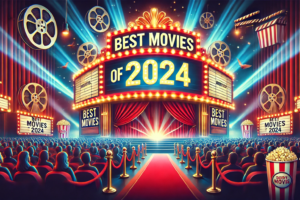Unmasking the Secrets: The Rise of Corporate Espionage Thrillers in Film and Fiction
Corporate espionage has long been a topic that blends the high-stakes world of business with the intrigue and suspense typically found in thrillers. Today, this theme has evolved into a full-blown genre within film and literature. From boardrooms filled with secrets to high-tech hacking and corporate sabotage, corporate espionage thrillers have become a captivating way to reflect the competitive and often ruthless nature of business.
In this blog, we explore the rise of corporate espionage thrillers, why they resonate with audiences, and some standout examples from both film and literature. Along the way, we’ll delve into topics such as industrial espionage, cyber espionage thrillers, and the ever-expanding world of techno-thrillers.
Corporate Espionage Thrillers: When Business Meets High-Stakes Suspense
In the world of fiction, corporate espionage thrillers provide a fascinating look at the inner workings of large corporations, where high-level business dealings intersect with morally ambiguous actions. The characters in these stories often find themselves navigating treacherous environments filled with backstabbing colleagues, corporate spying, and technological warfare.
Corporate espionage thrillers like The Firm by John Grisham or The Circle by Dave Eggers tap into a universal fear: the loss of privacy and the overwhelming power of corporations. These novels thrive on tension, where the stakes aren’t just financial, but personal. Readers and viewers alike are drawn to these stories because they highlight just how vulnerable we can be in an era dominated by big business and advanced technology.
Movies like Duplicity (2009) also offer a window into this cutthroat world. Featuring corporate spies entangled in a web of lies, deception, and romance, this film showcases how espionage plays out in the corporate landscape. Whether it’s stealing trade secrets or using high-tech surveillance to gain a competitive edge, corporate espionage thrillers give us a dramatic glimpse into the business world’s darker side.
Industrial Espionage: A Classic Element of Corporate Thrillers
Industrial espionage—the practice of spying on competitors to gain proprietary information—has been a fixture in corporate thrillers for decades. In the 1980s and 1990s, these stories often centered on secret documents, corporate moles, and intelligence agencies hired by corporations to get ahead.
Books like The Spy Who Came In from the Cold by John le Carré and movies such as Rising Sun (1993) explore the theme of industrial espionage, but within a corporate framework. These narratives feature companies willing to cross legal and ethical lines to obtain vital intelligence on their competitors, often leading to intense moral dilemmas for the protagonists.
As the world has become more digitized, so too has the scope of industrial espionage. No longer are spies simply breaking into offices to steal papers—instead, they hack into computer systems and exploit vulnerabilities in cybersecurity. This evolution is what keeps industrial espionage a relevant and compelling theme for today’s audiences.
Cyber Espionage Thrillers: A New Frontier in Business Intrigue
The rise of the internet and digital technology has made cyber espionage thrillers more relevant than ever. In today’s hyper-connected world, hackers and cybercriminals can infiltrate corporate networks and steal valuable information in a matter of seconds. These stories bring a new level of suspense as they explore the blurred lines between corporate competition and cyber warfare.
Movies like Snowden (2016) highlight the dangers of cyber espionage and how corporations and governments alike are vulnerable to cyber-attacks. This genre often portrays characters grappling with the ethical implications of using technology to invade privacy or gain the upper hand in business.
Cyber espionage thrillers reflect our modern fears about data breaches, cyber-attacks, and corporate surveillance. They tap into the anxieties of a world where technology has outpaced our ability to fully secure it. For example, novels like Zero Day by Mark Russinovich weave corporate intrigue with cutting-edge technology, showing how hackers can manipulate the fate of entire industries through their actions.
In these stories, the action doesn’t just take place in boardrooms but in the virtual world, where lines of code can mean the difference between success and disaster.
The Appeal of Techno-Thrillers in the Corporate World
While cyber espionage thrillers often focus on hackers and digital warfare, techno-thrillers take a broader approach, incorporating advanced technology, global conspiracies, and corporate espionage into their narratives. These stories delve deep into the impact of technology on society, business, and global politics.
One of the most well-known examples of this genre is Neuromancer by William Gibson, a novel that set the stage for the entire cyberpunk movement. Though it’s more dystopian than strictly corporate, it deals heavily with the theme of corporations wielding enormous power in a high-tech world. As techno-thrillers evolved, they continued to focus on how technology intersects with corporate espionage, from biotechnology to artificial intelligence.
More recent titles, like The Circle by Dave Eggers, offer a critique of tech companies’ growing influence over our personal data, illustrating the dangers of unchecked corporate power in the digital age. In these stories, technology serves as both a tool for success and a weapon for destruction, highlighting how it can be used to manipulate both markets and individuals.
Best Espionage Thrillers and Corporate Spy Stories to Read Now
If you’re looking to dive into some of the best corporate thrillers, there are several must-read titles that offer intense, suspense-filled plots centered around corporate espionage. Below are a few standout examples:
- The Firm by John Grisham: A legal and corporate thriller that centers on a young lawyer who becomes entangled in a web of corporate corruption.
- Bad Blood by John Carreyrou: Though technically nonfiction, this book reads like the best espionage thrillers, chronicling the rise and fall of Theranos and its CEO, Elizabeth Holmes.
- The Circle by Dave Eggers: A chilling portrayal of a tech corporation that knows everything about its users, questioning the ethics of surveillance and privacy.
- Rogue Lawyer by John Grisham: This novel blends corporate intrigue with legal drama, featuring a rogue lawyer who uncovers corruption at the highest levels.
These novels showcase how corporate espionage plays out in both the fictional and real world, offering readers a thrilling ride through business intrigue and moral complexity.
Why Corporate Espionage Thrillers Matter in Today’s World
Corporate espionage thrillers resonate with modern audiences because they tap into real-world anxieties about privacy, corporate greed, and the influence of technology. As companies continue to push the boundaries of innovation, the line between competition and espionage has become increasingly blurred.
These thrillers serve as cautionary tales, warning us about the lengths to which corporations will go to gain a competitive edge. Whether it’s through industrial espionage or the use of advanced hacking techniques in cyber espionage thrillers, these stories reflect the real-world concerns that come with living in a technology-driven world.
As long as corporations continue to wield enormous influence over our lives, the genre of corporate espionage thrillers will remain as relevant and compelling as ever.
The Future of Corporate Espionage Thrillers
With the growing reliance on digital technology and global business competition, the themes explored in corporate espionage thrillers are more pertinent than ever. Movies, books, and even real-world events continue to highlight the dangers of corporate spying and the potential consequences of living in a world dominated by powerful corporations.
From cyber espionage thrillers that explore hacking and cybersecurity breaches to classic industrial espionage stories, this genre is here to stay. As audiences continue to engage with these thrilling narratives, it’s clear that corporate espionage will remain a rich source of storytelling for years to come.
For more in-depth analyses of how entertainment reflects modern issues like corporate espionage, check out Regent Studies, where you’ll find resources that explore the intersection of business, technology, and culture.




